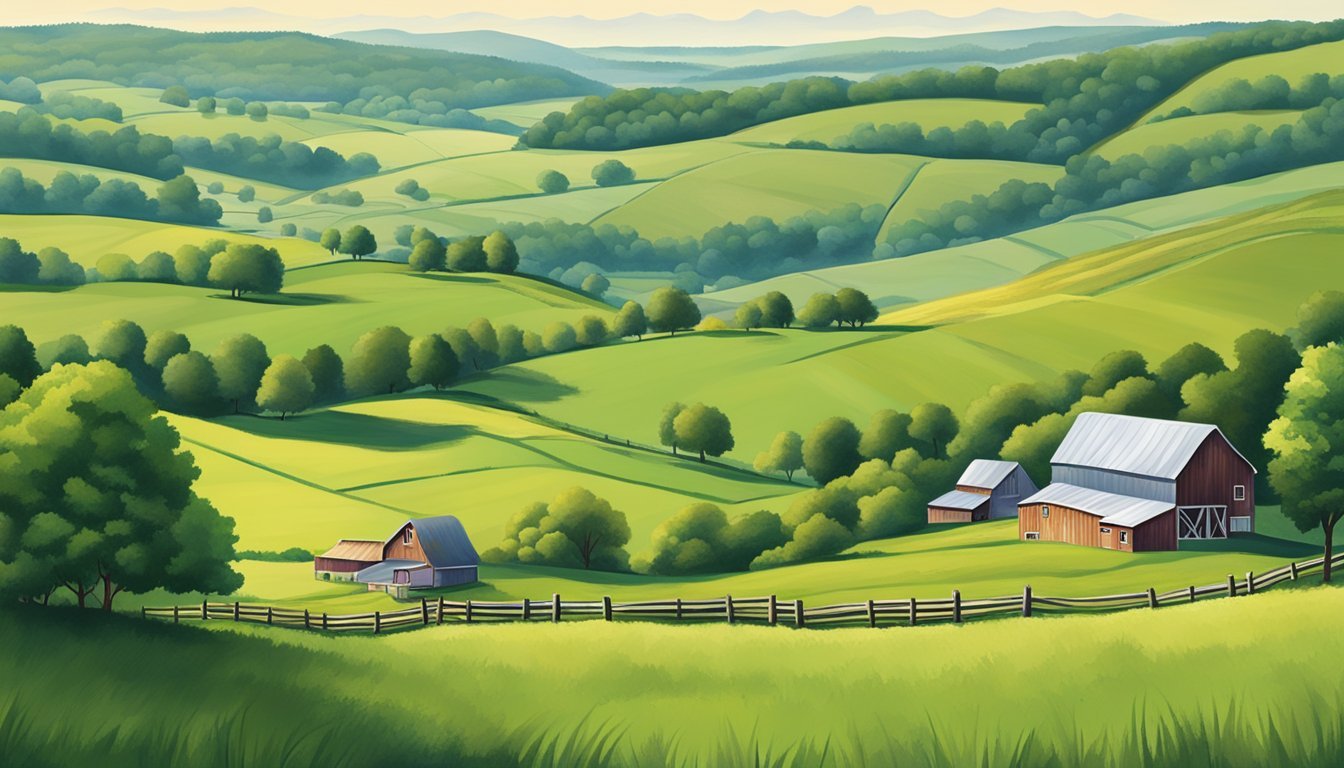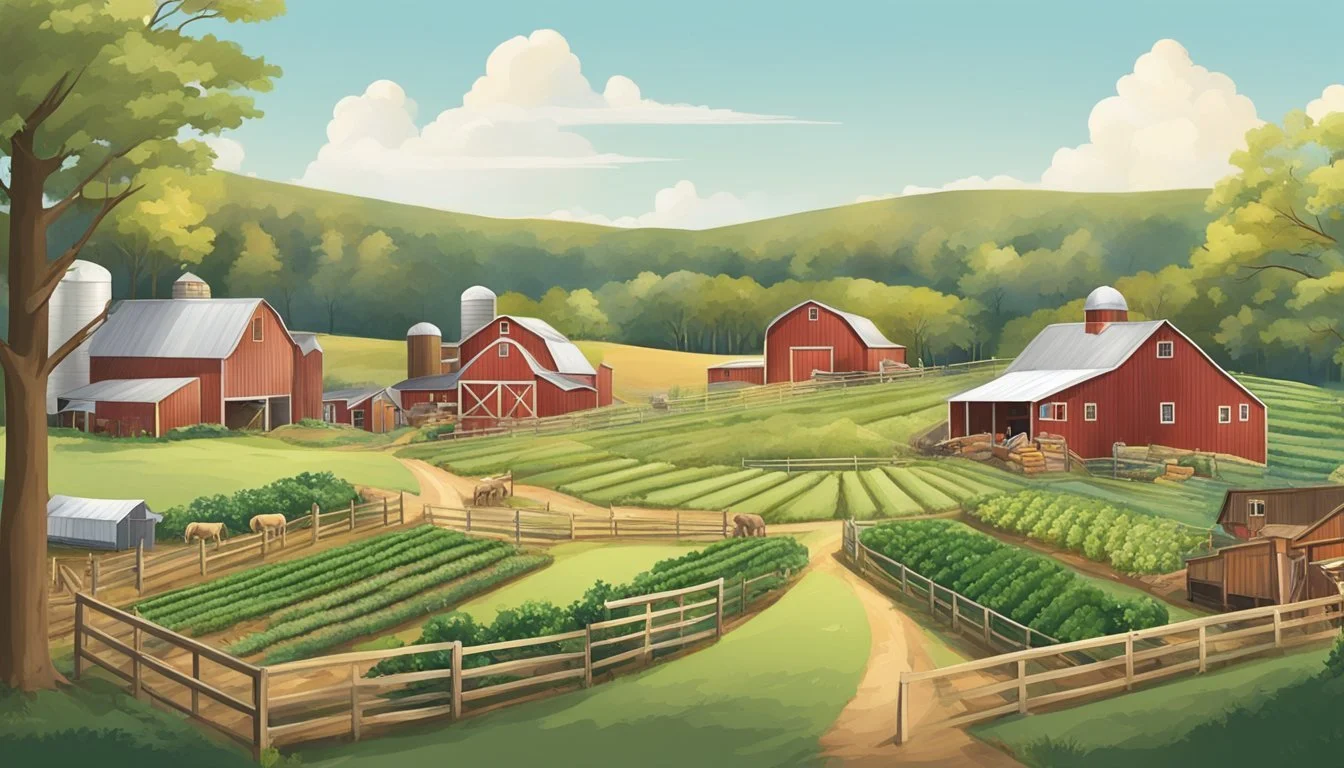Small Farms for Sale in Maryland
Your Guide to Rural Real Estate Opportunities
This Article is Part of State-by-State Guide to Buying Your First Small Farm
Maryland's diverse landscape and rich agricultural history make the state a desirable location for individuals seeking to invest in small farms. From the rolling hills of the Central Region to the fertile plains of the Eastern Shore, the availability of farms and ranches for sale caters to a variety of agricultural ventures. Prospective buyers can find properties that range in size and are suitable for different types of farming operations, offering opportunities for both seasoned farmers and those new to the agricultural community.
The real estate market for small farms in Maryland provides a spectrum of options, including turnkey operations with established pastures and outbuildings, as well as undeveloped land awaiting a custom touch. With properties situated in various counties such as Cecil, Montgomery, and Harford, listings showcase the varied terrains and potential for farming enterprises like crop cultivation, livestock rearing, and equestrian facilities. The lands for sale not only promise a rural lifestyle but also proximity to major cities, combining the serenity of country living with the convenience of urban amenities.
Current listings reflect a range of prices and property features, offering potential buyers the information needed to make informed decisions. The real estate market in Maryland is dynamic, with properties frequently entering and leaving the market, underlining the importance of staying updated on the latest offerings. Whether one is looking for a modest start-up farm or a sizeable agrarian investment, Maryland's small farm listings provide ample choices to consider.
Understanding the Maryland Farm Market
Maryland's farm market is characterized by a diverse mix of small-scale farms scattered throughout the state, with varying listing ages and prices. This section provides an in-depth look into the current state of Maryland's farming landscape, including key financial aspects and the typical market duration for properties.
Market Overview
Maryland offers a range of small farms for sale, influenced by the state's geographical diversity, from the rolling hills of its rural counties to the suburban settings closer to its urban centers. The market is segmented across its 24 counties, with properties that cater to both full-scale farming operations and hobby farming due to the existence of both large rural spaces and smaller plots suitable for personal use.
Average Listing Age and Purchase Price
The average listing age on the market tends to vary significantly across the state, largely influenced by location, farm size, and amenities. For instance, farms on the market near suburban areas may experience quicker turnover due to higher demand, whereas rural properties may stay listed longer.
The average purchase price can vary just as widely. Sample listings indicate prices such as:
$1,750,000 for 32 acres in Cecil County
$325,000 for 10 acres in Montgomery County
$2,999,000 for 7.48 acres in Harford County
These prices reflect the diversity in amenities, land size, and location within Maryland.
Price Per Acre Analysis
When considering the price per acre, it's evident that Maryland's market varies greatly based on location and land quality. For prospective buyers, understanding the price per acre within different counties is crucial:
In Cecil County, a listing shows a price per acre at approximately $54,688.
Montgomery County averages around $32,500 per acre.
Harford County's example listing would put the price per acre at about $400,803.
These figures highlight the significant variance in property prices in Maryland, often correlating with proximity to major cities, land fertility, potential for development, and existing infrastructure.
Types of Farms for Sale in Maryland
In Maryland, prospective buyers can find a diverse range of small farms available, catering to various agricultural interests and lifestyles. From comfortable hobby farms with homes to expansive rural mini farms and charming country farmettes, the state offers a unique landscape for farming enthusiasts.
Hobby Farms with Homes
Hobby Farms with Homes provide a blend of residential living and recreational farming. These properties typically feature a home suitable for family living and are equipped with adequate land for small-scale agriculture. For example, properties in Montgomery County and Cecil County often include well-maintained residences along with barns or other farming structures.
Rural Mini Farms
Rural Mini Farms are defined by their larger acreage compared to hobby farms, offering more space for serious agricultural pursuits. These farms can be found in areas like Harford County, boasting ample land for cultivation and livestock, yet still maintaining a manageable size for individual or family farming operations.
Country Farmettes
Country Farmettes are smaller than traditional farms and appeal to those looking for a rural lifestyle without committing to large-scale farming. Properties in Southern Maryland, including Charles County and Prince George's County, showcase farmettes that often include a modest-sized home, barn, and fenced pastures suited for personal agriculture or equestrian uses.
Farm Size and Acreage
When exploring small farms for sale in Maryland, prospective buyers consider the size and acreage crucial to meeting their agricultural and residential needs. The diversity in property size often corresponds to various types of farming activities, from hobby farms to livestock rearing.
Understanding Property Size
Property size is a fundamental factor for buyers as it determines the potential uses and limitations of a farm. In Maryland, small farms can range significantly in size, with some properties as modest as 3.5 acres to others spanning over 30 acres. The average property size for a small farm is often between 10 to 50 acres, which can comfortably support a diverse range of farming activities, including hobby farming and specialized agriculture.
Acreage for Sale
Current listings for small farms in Maryland show a variety of acreages for sale. For instance:
A farm in Cecil County offers 32 acres of land.
A 10-acre property is available in Montgomery County.
Harford County has a listing for a small farm that includes 7.48 acres.
These listings indicate a market where buyers can find smaller acreages suitable for personal or commercial uses, such as organic farming or sustainable living.
Optimal Acreage for Specific Livestock
For those interested in livestock farming, acreage needs can vary:
Goats: Typically, one can stock 6-8 goats per acre, making smaller acreages like the 10-acre farms available quite suitable for a small herd.
Cattle: Larger livestock such as beef cattle require more space, usually around 1-2 acres per animal, depending on the quality of pasture.
Buyers must assess the land's quality, including pasture condition and carrying capacity, to ensure that the acreage matches their livestock needs. Hobby farms, which often focus on diverse, small-scale production, can thrive on smaller plots where creative land use is paramount.
Livestock Considerations for Small Farms
When establishing a small farm in Maryland, it’s imperative to understand the specific needs and care required for different types of livestock. Each animal requires unique shelter, feeding, and management practices for profitable and sustainable farming.
Goat Farming Fundamentals
Goats are versatile livestock suited to small farms due to their moderate size and adaptability. They require sturdy fencing to prevent escapes and shelter that provides protection from the elements. Essential dietary needs include high-quality forage and clean water. Goats are browsers by nature, preferring to graze on a variety of plants, including shrubs and weeds.
Housing: Well-ventilated barns or three-sided shelters.
Feeding: Pasture, hay, and a mineral supplement.
Common Breeds: Nubian, Boer, and Alpine.
Sheep Rearing Basics
Sheep are a popular choice for small farms in Maryland for wool and meat production. They graze on grasses and require less intensive management than some other livestock. Their fencing needs are similar to goats and must prevent predators while providing enough pasture to roam.
Housing: Clean, dry, and well-ventilated shelters.
Feeding: Grass-based diets with occasional supplements.
Common Breeds: Suffolk, Dorset, and Merino.
Poultry Keeping Practices
Poultry, which includes chickens, ducks, and turkeys, can be raised for eggs, meat, or both. They need secure housing to protect them from predators and weather extremes. Coops should allow for adequate space, nesting areas, and perches. Proper sanitation practices are crucial to prevent disease.
Housing: Predator-proof coops with nesting boxes.
Feeding: Commercially available poultry feed and access to insects or greens.
Common Breeds: Rhode Island Red, Plymouth Rock, and Leghorn (for chickens).
Purchasing Process for Farms in Maryland
When looking to buy a small farm in Maryland, prospective buyers should understand the critical steps to ownership, the legal considerations involved, and the financing options available. Navigating these aspects efficiently can streamline the process of acquiring real estate, specifically land for sale in Maryland.
Steps to Ownership
Identify Property: Buyers should first locate small farms for sale that meet their criteria in terms of size, location, and price. Listings for properties can be found through real estate platforms or local land listings.
Due Diligence: Once they have identified potential properties, they need to perform thorough due diligence. This includes verifying property details, zoning laws, soil quality, water rights, and existing infrastructures, such as buildings and fences.
Make an Offer: Buyers should then proceed to make a written offer. This offer should reflect the value of the land and take into account any costs needed for improvements or maintenance.
Property Inspection: After the offer is accepted, a professional inspection should be carried out to identify any hidden issues that might affect the value or use of the property.
Closing: The final step is the closing process, which involves signing all necessary legal documents, transferring the title, and handling the financial transactions.
Legal Considerations
Property Rights: Buyers should ensure they understand all property rights associated with the farm. This includes surface rights, mineral rights, and water rights.
Zoning and Use Laws: Acknowledge local zoning laws to ensure the land can be used for its intended agricultural purposes.
Contracts and Agreements: Legal contracts detailing the sale should be carefully reviewed, preferably with the assistance of a real estate attorney specializing in agricultural properties.
Financing Options
Conventional Loans: Traditional bank loans often require a down payment and offer various interest rates and terms.
Government-Backed Loans: Loans from organizations such as the USDA can offer more favorable terms for those who qualify, particularly for buyers of small farms.
Owner Financing: In some cases, the seller might be willing to finance the purchase, typically resulting in a private mortgage between buyer and seller.
Buyers should thoroughly research and compare these options to determine the best financial path for their specific situation.




